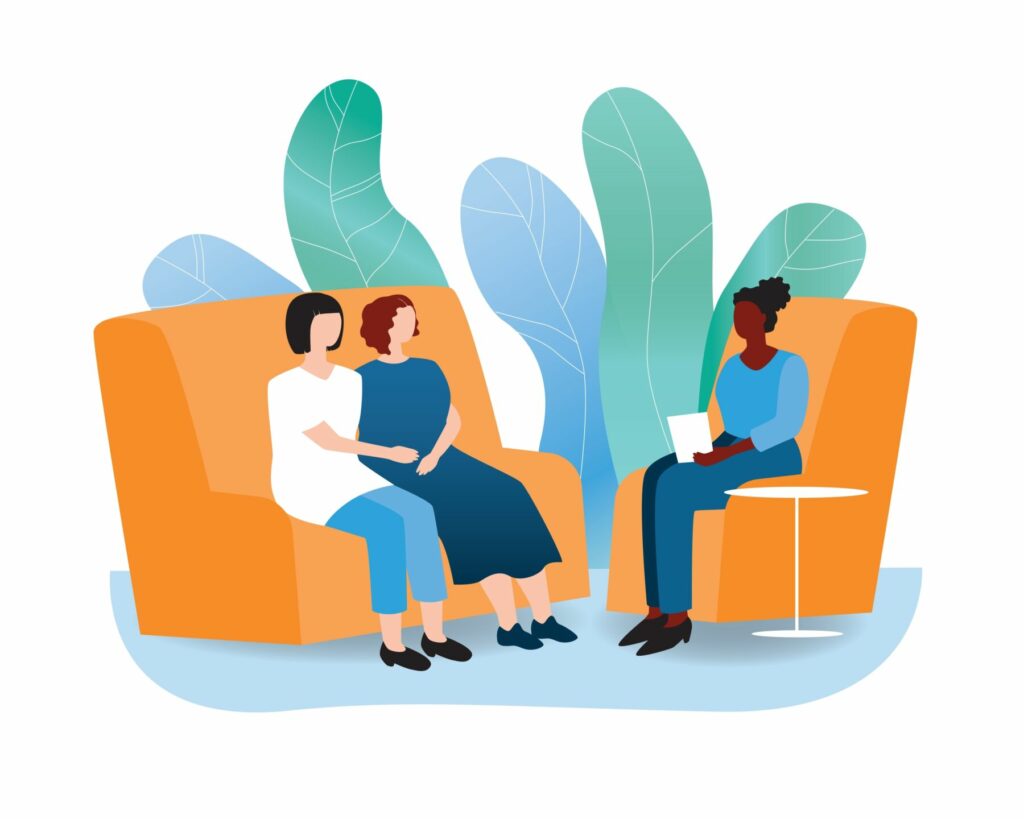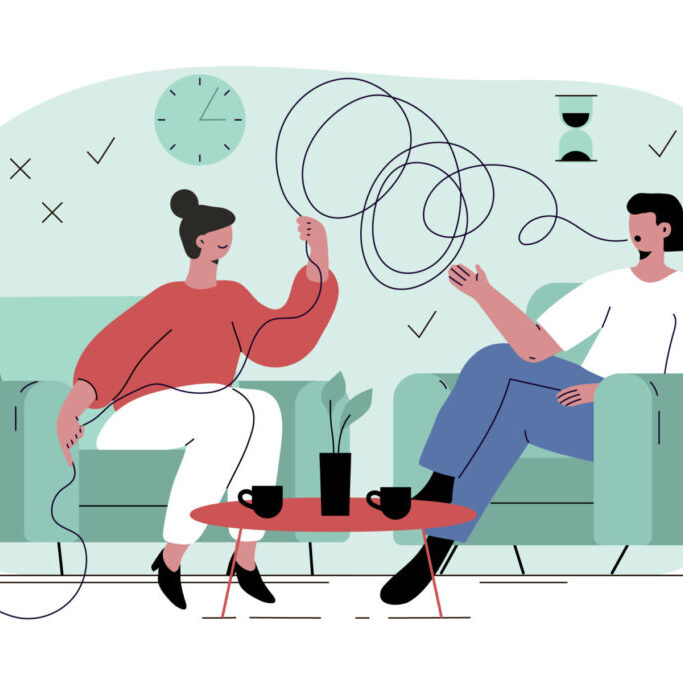Navigating Relationships as a Lesbian: Insights from Therapy

In many respects, queer relationships mirror non-queer relationships. On a day-to-day basis, lesbian partners share similar routines, face common relationship challenges, and experience the joys and trials of relationships. However, there are critical differences that stem from the unique experiences of being part of a marginalized community.
Let’s consider a few ways that lesbian relationships are unique and require specialized consideration in lesbian couples therapy.
- Minority Stress – One significant aspect is the experience of minority stress. Minority stress refers to the chronic stress faced by members of stigmatized minority groups, stemming from social prejudice and discrimination. This can manifest in various ways, from overt acts of prejudice to more subtle, systemic forms of bias.
For lesbian couples and relationships, this stress is compounded by societal attitudes, laws that often fail to protect their rights, and ingrained beliefs from childhood that need to be unlearned and redefined. - Lack of Support – Lesbian partners might encounter familial rejection, legal inequities, religious condemnation, economic disadvantages, and social isolation. Unlike heterosexual couples, whose relationship norms and boundaries are well-defined and widely accepted, lesbian couples and relationships must often navigate these aspects without a clear societal template.
This lack of predefined norms can lead to a greater likelihood of alternative relationship structures, such as polyamory or consensual non-monogamy, as partners explore what works best for them outside traditional frameworks. - Long-Term Impacts of Sexual Identity, Sexual History, Familial Support, and Cultural Intersections – Coming out is a pivotal moment in the lives of many lesbian people, significantly influencing their relationships. In counseling for lesbian couples and relationships, therapists often encounter partners at different stages of their coming out process, which can create tension. The evolution of sexual identity varies between partners, impacting the relationship’s balance and visibility within social circles.
Additionally, cultural backgrounds and familial support play crucial roles, as differing origins or conservative upbringings can add layers of complexity. Addressing these familial and cultural differences is essential in couples therapy LGBT sessions. Furthermore, varying levels of comfort and experience with sexuality can lead to intimacy issues. It is vital for therapy to foster open communication and understanding to build a healthy sexual relationship. - Babies or No Babies – Lesbian couples face unique challenges in family planning, with decisions often being logistical, financial, and deeply emotional. The journey to parenthood (regardless of whether the path chosen is IVF, surrogacy, or adoption) can be fraught with emotional struggles and potential discrimination, leading to feelings of resentment and frustration.
Therapy offers a safe space to address these issues and develop coping strategies. Balancing the joy of starting a family with potential disappointments requires skilled therapeutic guidance to help partners support each other through the highs and lows. - Lack of Societal Guidelines – Inherent to queer relationships is an absence of societal guidelines for roles in the relationship, both an asset to intentionally designed queer relationships as well as a challenge for some. Lesbian relationships often challenge traditional gender roles, creating relationships based on mutual respect and actual abilities rather than societal expectations.
However, some may inadvertently fall into traditional roles, necessitating an examination of these dynamics in therapy. Counseling for lesbian couples and relationships involves ensuring that roles within the relationship are clearly defined and mutually agreed upon. Clarifying expectations around household and emotional tasks is crucial for harmony.Lesbian couples therapy facilitates discussions about these responsibilities, helping partners understand each other’s perspectives and negotiate equitable arrangements.
Communication is Often Still the Chief Complaint
Communication problems are common in both LGBT and heterosexual relationships, with unique challenges arising from societal pressures. Relationship and lesbian couples therapy provides a neutral space for partners to discuss their issues with a skilled therapist. Dr. John Gottman’s theory of the “Four Horsemen”—criticism, contempt, defensiveness, and stonewalling—suggests that any of their presence can significantly harm relationships.
Relationship therapy involves identifying these destructive behaviors and implementing strategies to counteract them. Effective conflict resolution techniques, such as self-soothing and using humor to de-escalate tensions, are emphasized to help partners navigate conflicts constructively.
How Can Counseling for Lesbian Couples and Relationships Help?
A skilled mental health professional, well-versed in the nuances of LGBTQ+ relationships, can provide essential support for lesbian couples and relationships. These LGBT affirming therapists are acutely aware of the traditional biases that may affect same-sex couples and approach therapy with sensitivity and inclusivity.
While the therapeutic techniques used for heterosexual couples are applicable, it’s crucial for therapists to consider the developmental and socio-cultural contexts unique to lesbian relationships.
In counseling for lesbian couples and relationships, the therapist will evaluate the relationship environment, taking into account various factors such as the developmental stages of each partner, external influences (like family and community support or alienation), mental or physical health issues, domestic violence, and discrepancies in stages of coming out or identity acceptance.
Addressing the concept of “multiple social identities” is also vital in couples therapy LGBT sessions. Cultural differences within the relationship, such as religion, ethnicity, socio-economic status, or immigration status, can also pose significant challenges. A therapist helps partners reflect on and manage these diverse aspects, fostering understanding and unity.
Therapists can normalize feelings of fear or anxiety about intimacy, framing them as developmentally appropriate reactions to societal bias against same-sex attraction. By broadening the perspective, partners can shift from viewing their issues as personal failings to understanding them within a wider societal context.
Healthy Tips for Lesbian Relationships
While counseling for lesbian couples and relationships can be very helpful, there are many actions people in lesbian relationships can take to support their partner(s) and relationship:
- Validate Feelings – It’s perfectly okay if your partner is experiencing sadness, hurt, frustration, or any other emotion that you might want to fix or understand. As long as emotions are not used to communicate passive-aggressively, let her feel what she feels without making it about you.
Emotions alert us to joy, danger, loss, violation, or other situations that require attention. Personalizing her feelings interrupts a vital process that helps her clarify things for herself. Communicate through words and behaviors—emotions are not actions; we don’t “anger,” but we express anger. Clarify what you’re feeling and then communicate with words or actions. - Resentments Create Loneliness – Holding on to past hurts as a way to protect yourself causes more harm than good. If you choose this relationship, you’re choosing all of it, not just the parts that feel good. Deal with old hurts and resentments, then let them go. Forgiveness is essential for moving forward and fostering a loving, supportive relationship.
- Stick to the Facts – You might have a superpower, but it’s not mind-reading. Trust me on this. When you’re sure you know what she is thinking, feeling, wanting, or not wanting, fact-check. Believe her if she says you’re misunderstanding her or that your perceptions are wrong.
They are her thoughts and feelings, so she really does have the final say about what is true for her. Even if she changes her mind later, believe her now. Focus on your feelings and thoughts, share those, and let her do the same when she’s ready. - Show Your Desire – Research indicates that lesbians want more sex with their partners, but many women do not want to initiate it. In the quest for commitment, dating, flirting, romancing, and all the good stuff often get rushed and sometimes neglected altogether.
Remember those skills you used when courting one another – romance her, flirt, and let her know you desire her. Plan regular date nights or surprise her with small gestures of love. Keeping the romance alive requires effort and creativity but pays off in keeping the connection strong and exciting. - Talk. A lot – Open, honest communication is the bedrock of any healthy relationship. Make time to talk about your feelings, thoughts, and concerns regularly. Create a safe space where both of you can share without fear of judgment. Effective communication helps resolve conflicts and strengthens your bond.
- Respect Independence – Maintaining individuality is crucial in a healthy relationship. Encourage each other to pursue personal interests, hobbies, and friendships. Respecting your partner’s need for space and time apart fosters mutual respect and prevents feelings of suffocation.
- Practice Gratitude – Show appreciation for your partner(s) daily. Acknowledging the little things she does can go a long way in making her feel valued and loved. Gratitude helps build a positive atmosphere in your relationship and keeps you focused on each other’s good qualities.
- Build a Strong Support System – A strong support system outside of your relationship is essential. Having friends, family, or a community to turn to can provide additional perspectives and support. It also helps to have trusted people to lean on during tough times, ensuring that your relationship does not become isolated.
By incorporating these suggestions into your relationship, you can foster a deeper connection, build a stronger foundation, and maintain a loving, healthy partnership.
The resilience of same-sex couples, despite facing numerous challenges, is a testament to their strength and determination. Lesbian couples, in particular, often demonstrate a strong sense of interdependence and perspective, which helps them thrive.
By reinforcing these strengths and addressing areas of concern, counseling for lesbian couples and relationships can significantly enhance mutuality, intimacy, and overall relationship satisfaction. Through dedicated support and understanding, therapists can help lesbian partners build resilient and fulfilling relationships.
This blog is made for informational and educational purposes only. It is not medical advice. The information in this blog is not intended to (1) replace a one-on-one relationship with a qualified licensed health care provider, (2) create or establish a provider-patient relationship, or (3) create a duty for us to follow up with you.



